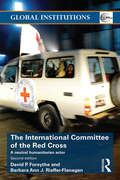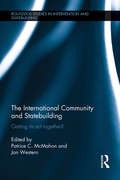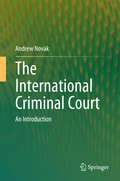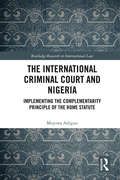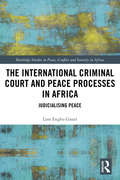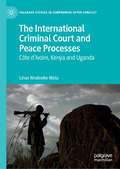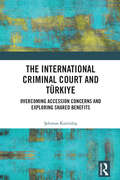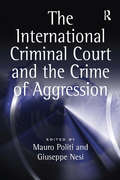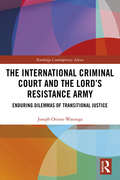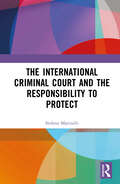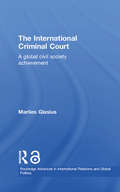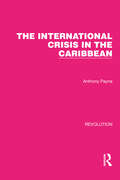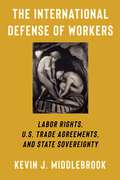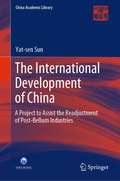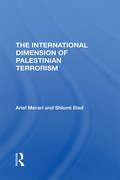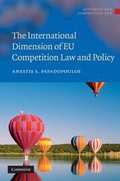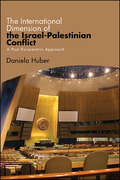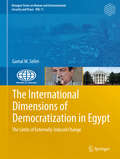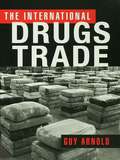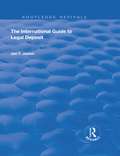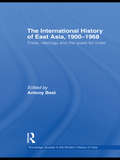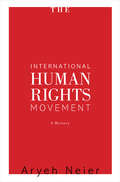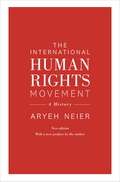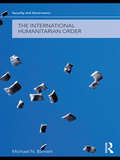- Table View
- List View
The International Committee of the Red Cross: A Neutral Humanitarian Actor (Global Institutions)
by David P. Forsythe Barbara Ann Rieffer-FlanaganThe International Committee of the Red Cross (ICRC) has a complex position in international relations, being the guardian of international humanitarian law but often acting discretely to advance human dignity. Treated by most governments as if it were an inter-governmental organization, the ICRC is a non-governmental organization, all-Swiss at the top, and it is given rights and duties in the 1949 Geneva Conventions for Victims of War. Written by two formidable experts in the field, this book analyzes international humanitarian action as practiced by the International Red Cross, explaining its history and structure as well as examining contemporary field experience and broad diplomatic initiatives related to its principal tasks. Such tasks include: ensuring that detention conditions are humane for those imprisoned by reason of political conflict or war providing material and moral relief in conflict promoting development of the humanitarian part of the laws of war improving the unity and effectiveness of the movement Fully updated throughout, the new edition will also include brand new material on: armed actors who do not accept humanitarian restrictions on their actions, including expanded coverage of the Islamic State (ISIL, ISIS), Al Shabab, and Boko Haram, among others Syrian internationalized civil war issue of drone strikes and targeted killings, and the continuing push for regulation of what is called cyber war the question of the field of application of international humanitarian law (what is the battlefield?). Particularly when states declare "war" on "terrorist groups" operating inside other states regulation of new weapons and new uses of old weapons
The International Community and Statebuilding: Getting Its Act Together? (Routledge Studies in Intervention and Statebuilding)
by Patrice C. McMahon and Jon WesternThis book brings together policymakers and academics to analyse the international community’s performance in post-war statebuilding projects. In the past twenty years, statebuilding has emerged as a centerpiece of international efforts to stabilize violent conflicts. From the Balkans, to Iraq, to Afghanistan, it has become widely accepted that statebuilding—defined as the development of transparent and accountable political institutions, stable and sustainable economic structures, professional public administrations, and civilian-controlled security services—is essential to the long-term stability of post-conflict settlements. The International Community and Statebuilding brings together senior-level policymakers and academics in order to analyse the international community’s performance in post-war statebuilding projects. Filling an important gap in the existing body of work on this topic, the contributors explore how international state builders have attempted to negotiate the intersections of multilateralism, competing strategic priorities and agendas, organizational complexity, and domestic politics. This book will be of much interest to students of statebuilding, peacebuilding, war and conflict studies, and International Relations in general.
The International Criminal Court
by Andrew NovakThis book is about the International Criminal Court (ICC), a new and highly distinctive criminal justice institution with the ability to prosecute the highest-level government officials, including heads of state, even in countries that have not accepted its jurisdiction. The book explores the historical development of international criminal law and the formal legal structure created by the Rome Statute, against the background of the Court's search for objectivity in a political global environment. The book reviews the operations of the Court in practice and the Court's position in the power politics of the international system. It discusses and clarifies all stages of an international criminal proceeding from the opening of the investigation to sentencing, reparations, and final appeals in the context of its restorative justice mission. Making appropriate comparisons and contrasts between the international criminal justice system and domestic and national systems, the book fills a gap in international criminal justice study.
The International Criminal Court and Nigeria: Implementing the Complementarity Principle of the Rome Statute (Routledge Research in International Law)
by Muyiwa AdigunIf Nigeria fails to prosecute the crimes recognised under the Rome Statute, then the International Criminal Court (ICC) will intervene. The ICC is only expected to complement the criminal justice system in Nigeria and is not a court of first instance, but one of last resort. This is what is known as the principle of complementarity. Before the ICC can step in, it must make a finding of ‘unwillingness’ or ‘inability’ on the part of Nigeria. It is only after this finding is made that the ICC can take over the prosecution of the crimes recognised under the Statute from Nigeria. This book examines the criminal justice process in Nigeria and discovers that the justice system is latent with the requirements of ‘unwillingness’ and ‘inability.’ The requirements, which serve as tests for assessment, are as they are laid down by the Rome Statute and interpreted by the ICC. This book offers recommendations as to what Nigeria must do in order to avoid the ICC intervention by reversing those parameters that give rise to ‘unwillingness’ and ‘inability.’ The International Criminal Court and Nigeria: Implementing the Complementarity Principle of the Rome Statute offers a contribution to the advancement of international law and will be of practical use to African countries. It aims to sensitise policy makers in different African countries in respect of policy options open to them to close impunity gap in their respective countries. This volume addresses the topics with regard to international criminal law and comparative public law and will be of interest to researchers, academics, organizations, and students in the fields of international law, governance, and comparative criminal justice.
The International Criminal Court and Peace Processes in Africa: Judicialising Peace (Routledge Studies in Peace, Conflict and Security in Africa)
by Line GisselThe book investigates how involvement by the International Criminal Court (ICC) affects efforts to negotiate peace. It offers an interpretive account of how peace negotiators and mediators in two peace processes in Uganda and Kenya sought to navigate and understand the new terrain of international justice, while also tracing how and why international decision-making processes interfered with the negotiations, narrated the conflicts and insisted on a narrow scope of justice. Building on this interpretive analysis, a comparative analysis of peace processes in Uganda, Kenya and Colombia explores a set of general features pertaining to the judicialisation of peace. Line Engbo Gissel argues that the level and timing of ICC involvement is key to the ICC’s impact on peace processes and explains why this is the case: a high level of ICC involvement during the negotiation phase of a peace process delegates politico-legal and discursive authority away from peace process actors, while a low level of ICC involvement during the negotiation phase retains such forms of authority at the level of the peace process. As politico-legal authority enables the resolution of sticking points and discursive authority constructs the conflict and its resolution, the location of authority is important for the peace process. Furthermore, judicialisation also affects the negotiation and implementation of a justice policy, with a narrowing scope for justice accompanying increasing levels of ICC involvement.
The International Criminal Court and Peace Processes: Cȏte d’Ivoire, Kenya and Uganda (Palgrave Studies in Compromise after Conflict)
by Linus Nnabuike MaluThis book explores the extent to which the International Criminal Court (ICC) has influenced peace processes in Cȏte d’Ivoire, Kenya and Uganda. It examines how the prosecution of those who bear the greatest responsibility for crimes committed in these countries may have negatively or positively influenced the process of making peace in their wake. It is concerned with how international accountability affects post-conflict countries and what the ICC brings to peace processes. The central question addressed by the book is whether justice spurs peace in post- conflict societies or whether justice complicates the peace process. If so, how? Relying on qualitative studies in these countries, this book comparatively analyses the impact of the interventions of the ICC in Uganda (2004), Kenya (after the 2007/2008 post-election violence), and Cȏte d’Ivoire. Its aim is to provide an evidence-based account of how the involvement of the ICC in these countries influences the processes of promoting peace. To gauge this, Malu develops an analytical framework which is based on four variables: deterrence, victims’ rights, reconciliation and accountability to the law. This book will appeal to those interested in post-conflict reconstruction, transitional justice, peace studies, conflict transformation, and international criminal law, including peace practitioners and those working in the field of international justice.
The International Criminal Court and Türkiye: Overcoming Accession Concerns and Exploring Shared Benefits
by Şehmus KurtuluşThe establishment of the International Criminal Court (ICC) is a landmark development in the field of international criminal law, marking a significant step forward in the pursuit of global justice. Having gained the recognition of 125 states, the ICC stands as the world’s first and only permanent international tribunal capable of trying individuals for the gravest crimes of international concern. This book provides a comprehensive analysis of the challenges and opportunities associated with becoming a member of the ICC, using Türkiye as a case study to explore broader issues relevant to other states that have not yet joined the Court. It argues that the concerns behind Türkiye’s reluctance to sign the founding treaty of the ICC are not substantial enough to justify avoiding the Court’s jurisdiction and that non-accession does not guarantee immunity from ICC oversight. While primarily focused on Türkiye, the book offers insights that could inform the decisions of other non-signatory states, particularly those with similar reservations about the Court. It demonstrates that the advantages Türkiye stands to gain by joining the ICC are largely applicable to other non-signatory states as well. Through this analysis, the book underscores the ICC's critical role as a global institution and its invaluable contribution to advancing international criminal justice. Presenting a valuable overview of the world’s first and only permanent international criminal court, the work will be a valuable resource for academics, researchers and policymakers working in the fields of International Law and International Relations.
The International Criminal Court and the Crime of Aggression
by Mauro PolitiThe Rome Statute of the International Criminal Court entered into force in 2002 and the ICC will soon be fully operational. Earlier in the ICC process, an international conference was held in Trento to address a specific issue that is still unresolved in the post-Rome negotiations: the crime of aggression. Article 5 of the ICC Statute includes aggression, yet the Statute postpones the exercise of its jurisdiction over the crime of aggression until such time as further provisions have been prepared on the definition of this crime and on the related conditions for the Court's intervention. This important volume collects the papers given by the participants at the Trento Conference. The volume is divided into three parts: the historical background of the crime of aggression; the definition of the crime of aggression, in light of proposals in the Preparatory Commission; and various points of view on the relationship between the Court's competence in adjudicating cases of alleged crimes of aggression and the Security Council's competence.
The International Criminal Court and the Lord’s Resistance Army: Enduring Dilemmas of Transitional Justice (Routledge Contemporary Africa)
by Joseph Otieno WasongaThis book interrogates the sharp contrast that emerged between demands of the norms of international rule of law and the interests of conflict resolution at a local level in northern Uganda. Examining how the nature and character of complex conflict situations like that of northern Uganda confounds the application of transitional justice mechanisms, The International Criminal Court and the Lord’s Resistance Army reveals the enduring dilemmas of transitional justice. Scrutinising the competing interests of punitive approaches to contemporary transitional justice and the political considerations for peace that may entail entering into dialogue with criminals, this book approaches such concepts from the perspective of international standards and the standpoint of the victims. While exploring the complexities of transitional justice processes, the book interrogates prevailing assumptions, proposing a broader conception that places at the centre local structural conditions associated with a conflict. The International Criminal Court and the Lord’s Resistance Army will be of interest to scholars and students of international law, African politics and conflict studies.
The International Criminal Court and the Responsibility to Protect
by Stefano MarinelliThis book examines the parallel development and interaction between the International Criminal Court (ICC) and the doctrine of the Responsibility to Protect (RtoP), assessing this relationship over time and through case studies of Darfur, Libya, and Syria. The similarities and connections between the doctrine and the Court have been highlighted by UN bodies, the organs of the Court, and scholars, yet their relationship and common impact on international law have been less explored. This book fills this gap in presenting an overview of how the development of RtoP and the ICC affect various branches of international law. The research shows that while the doctrine and the Court experienced significant implementation problems in their first decades of life, they nonetheless have the potential to contribute to the historical evolution of international law in combining their values of promoting international peace and protecting human rights. This interdisciplinary study will be useful for scholars of international law and international relations. It will also be beneficial to persons working for international organisations and for civil society organisations focused on the activity of the ICC and on the development of RtoP.
The International Criminal Court: A Global Civil Society Achievement (Routledge Advances in International Relations and Global Politics #Vol. 39)
by Marlies GlasiusA new examination of the International Criminal Court (ICC) from a political science and international relations perspective. It describes the main features of the court and discusses the political negotiations and the on-going clashes between those states who oppose the court, particularly the United States, and those who defend it. It also makes these issues accessible to non-lawyers and presents effective advocacy strategies for non-governmental organizations. It also delivers essential background to the place of the US in international relations and makes a major contribution to thinking about the ICC’s future. While global civil society does not deliver global democracy, it does contribute to more transparent, more deliberative and more ethical international decision-making which is ultimately preferable to a world of isolated sovereign states with no accountability outside their borders, or exclusive and secretive state-to-state diplomacy. This book will be of great interest to students and scholars of international relations, international law, globalization and global governance.
The International Crisis in the Caribbean (Routledge Library Editions: Revolution #15)
by Anthony PayneThis book, first published in 1984, presents a comprehensive survey of the forces of change that operate in the Caribbean, an area of political instability at the time. It examines the internal politics of the different countries and considers the roles of the United States, Cuba, the European and new Latin American powers in the political conflicts, coups and revolutions.
The International Defense of Workers: Labor Rights, U.S. Trade Agreements, and State Sovereignty (Woodrow Wilson Center Series)
by Kevin J. MiddlebrookInternational trade agreements have often been criticized for limited attention to the rights of workers. The North American Agreement on Labor Cooperation (NAALC), a side agreement to the North American Free Trade Agreement (NAFTA), stands out for linking labor rights provisions to a U.S. trade agreement. Kevin J. Middlebrook provides a comprehensive and systematic examination of the NAALC, assessing its efficacy in protecting workers’ rights over the entire period it was in effect and demonstrating its broader significance for the role of trade and labor standards in U.S. foreign policy.Placing the NAALC in comparative context, Middlebrook considers various ways of promoting workers’ rights and how other U.S. international trade agreements have influenced labor rights abroad. He investigates the origins of the agreement; the political controversies among Canada, Mexico, and the United States over its scope; how the agreement operated in practice; and its longer-term policy legacies. Middlebrook emphasizes the tension between state sovereignty and the international promotion of labor rights in the negotiation and implementation of trade agreements, as well as how labor movements in one partner country can galvanize action in others.Drawing on interviews with high-level officials involved in the trade negotiations and previously unexamined primary sources, The International Defense of Workers is a groundbreaking analysis of the effects of U.S. trade agreements on labor rights.
The International Development of China: A Project to Assist the Readjustment of Post-Bellum Industries (China Academic Library)
by Yat-sen SunThis book presents a rough sketch of Dr. Yat-sen Sun’s (1866-1925) requirements for modernizing China and elaborates on Sun’s desire for the then China to implement a sweeping wave of economic reconstruction and development reforms concerning its railroads and highways, river conservancy and irrigation, new ports and modern cities, by absorbing international capital coming to China. In the preface to this book, first published in 1922, Yat-sen Sun posits, “Unless the Chinese question can be settled peacefully, another world war greater and more terrible than the one just past will be inevitable.” In order to solve the “Chinese question,” he suggested that the country’s vast resources be developed internationally under a socialistic scheme, both for the good of the world in general and the Chinese people in particular. It was his hope that such a scheme would abolish the prevalent spheres of influence of the time, and that the class struggle between capital and labor could be avoided. In this book, Yat-sen Sun presents his solutions for three great questions of global importance: International War, Commercial War and Class War.
The International Dimension Of Palestinian Terrorism
by Ariel Merari Shlomi EladTerrorism, by its very nature, is a dynamic and rapidly changing phenomenon. This is particularly true of Palestinian terrorism: it is pluralistic in composition, flourishes in a highly volatile region, and is affected by numerous external actors and elements. Hence any attempt to produce research on Palestinian terrorism of a completely up-to-date nature is doomed to failure. Most of the work on this study was completed by the fall of 1985, and the statistics presented generally cover the period 1968-1984.
The International Dimension of EU Competition Law and Policy
by Anestis S. PapadopoulosModern competition law was first employed by countries over one hundred years ago in order to address issues relating to restrictions of trade at the national level. Recent international economic integration has weakened the distinction between the domestic and the international in several fields of economic activity, and consequently the laws which regulate such activity, competition law included. Several attempts to address the paradox of adopting national competition rules to address international issues have been made at the international, regional and (lately) bilateral levels. This book discusses the international dimension of EU competition law, and examines the position taken by the EU in four distinct categories of international agreements which are devoted to competition or include competition provisions. In particular, it analyses the EU's position with regard to bilateral enforcement cooperation agreements, bilateral free trade agreements, plurilateral-regional agreements and the long negotiations for the adoption of a multilateral competition regime.
The International Dimension of the Israel-Palestinian Conflict: A Post-Eurocentric Approach
by Daniela Huber2021 CHOICE Outstanding Academic TitleDespite decades of international diplomatic efforts, a solution to the Israel-Palestinian conflict is still as elusive as ever, forcing us to ask the question: have global and regional powers, rather than helping to solve the conflict, actually led to its perpetuation? This book explores this question from a post-Eurocentric perspective. Departing from the literature that sees the United States, Europe, and Russia as outside diplomatic actors, and regional powers such as Egypt, Iran, Saudi Arabia, and Turkey as part of the conflict, Daniela Huber instead conceptualizes all of them as actors in the regional/international dimension of the conflict, which they (re)produce through their role performances. Anchored in grounded theory and critical discourse analysis, she examines the scripts that have been performed by these powers at the United Nations and how the authoritative international framing of the conflict has evolved in the UN Security Council and General Assembly, identifying periods of continuity and ruptures in these scripts, as well as alternatives to them.
The International Dimensions of Democratization in Egypt
by Gamal M. SelimThis book purports to examine the international dimensions of the democratization process in Egypt in the post Cold War era; a theme which acquired significance at the academic and policy-oriented levels in light of the growing internationalization of reform arrangements in the Arab world in post 9/11 and the greater involvement of external powers in Arab politics following the Arab Spring uprisings. During the second half of the twentieth century, the mainstream scholarship presented the democratization process as the outcome of domestic conditions not significantly influenced by actors outside the nation-state. With the end of the Cold War, this perspective was challenged as a result of the third wave of democratization and the subsequent growth of the "good governance" discourse on the agenda of the international development establishment. The new perspective attached a more significant role to external factors in the democratization process than was originally conceptualized.
The International Diplomacy of Israel’s Founders
by John QuigleyDuring the early to mid-twentieth century, the Zionist Organization secured a series of political victories on the international stage, leading to the foundation of a Jewish state and to its ability to expand its territorial control within Palestine. The International Diplomacy of Israel's Founders provides a revisionist account of the founding of Israel by exposing the misrepresentations and false assurances of Zionist diplomats during this formative period of Israeli history. By comparing diplomatic statements at the United Nations and elsewhere against the historical record, it sheds new light on the legacies of such leaders as Chaim Weizmann, David Ben Gurion, Abba Eban, and Shabtai Rosenne. Including coverage of little-discussed moments in early Israeli history, this book offers an important new perspective for anyone interested in the history of the Israeli-Palestinian conflict.
The International Drugs Trade
by Guy ArnoldExamines the abuse of drugs in the West and the scope and value of the illegal drugs business, and the failure of the drug enforcement programmes either to curtail the supply of drugs or to persuade users to abandon their habit.
The International Guide to Legal Deposit (Routledge Revivals)
by Jan T. JasionFirst published in 1991, this volume aims to take a close look at the laws of 27 countries to locate what others value in the realm of legal deposit and heighten our awareness of its importance for free access to information. It responds to the great concern over the freedom of the press, the end of censorship and absolute government secrecy, and guaranteed public access to information. The term ‘legal deposit’, known in the UK and several former-British Empire countries as ‘copyright deposit’, originated in France in 1537 and has spread throughout the world, though the definition of the term remains questionable. Jan T. Jasion examines this through three parts: various aspects of legal deposit, comparing legal deposit worldwide and a detailed examination of the laws of 27 countries to compare the various national interpretations of legal deposit.
The International History of East Asia, 1900-1968: Trade, Ideology and the Quest for Order (Routledge Studies in the Modern History of Asia)
by Antony BestThis book provides a broad account of the international history of East Asia from 1900 to 1968 - a subject that is essential to any understanding of the modern epoch. Whereas much of the scholarship on this subject has focused purely on the immediate origins and consequences of violent events such as wars and revolutions, this book demonstrates the importance of also considering other forces such as ideology, trade and cultural images that have helped shape East Asian international history. It analyses how the development of the region was influenced by ideological competition and ‘orientalism’, by both multilateral and unilateral efforts to instil order, and by the changing nature of international trade. It considers a number of important topics such as the concept of the ‘open door’; the rise and influence of progressive internationalism in the forum of the League of Nations; the development of anti-colonial nationalism and anti-Western internationalism in the shape of pan-Asianism; and the onset of the Cold War. It also includes detailed case studies of subjects including the administration of the Chinese Maritime Customs Service; the international effort to regulate the trade in opium; and the significance of intra-Asian trade. Overall, this book constitutes an impressive account of the international history of East Asia, and is an important contribution to the interpretive study of this crucial period of history.
The International Human Rights Movement
by Aryeh NeierDuring the past several decades, the international human rights movement has had a crucial hand in the struggle against totalitarian regimes, cruelties in wars, and crimes against humanity. Today, it grapples with the war against terror and subsequent abuses of government power. In The International Human Rights Movement, Aryeh Neier--a leading figure and a founder of the contemporary movement--offers a comprehensive and authoritative account of this global force, from its beginnings in the seventeenth and eighteenth centuries to its essential place in world affairs today. Neier combines analysis with personal experience, and gives a unique insider's perspective on the movement's goals, the disputes about its mission, and its rise to international importance. Discussing the movement's origins, Neier looks at the dissenters who fought for religious freedoms in seventeenth-century England and the abolitionists who opposed slavery before the Civil War era. He pays special attention to the period from the 1970s onward, and he describes the growth of the human rights movement after the Helsinki Accords, the roles played by American presidential administrations, and the astonishing Arab revolutions of 2011. Neier argues that the contemporary human rights movement was, to a large extent, an outgrowth of the Cold War, and he demonstrates how it became the driving influence in international law, institutions, and rights. Throughout, Neier highlights key figures, controversies, and organizations, including Amnesty International and Human Rights Watch, and he considers the challenges to come. Illuminating and insightful, The International Human Rights Movement is a remarkable account of a significant world movement, told by a key figure in its evolution.
The International Human Rights Movement: A History (Human Rights and Crimes against Humanity #40)
by Aryeh NeierA fascinating history of the international human rights movement as seen by one of its foundersDuring the past several decades, the international human rights movement has had a crucial hand in struggles against totalitarian regimes and crimes against humanity. Today, it grapples with the war against terror and subsequent abuses of government power. In The International Human Rights Movement, Aryeh Neier—a leading figure and a founder of the contemporary movement—offers a comprehensive, authoritative account of this global force, from its beginnings in the seventeenth and eighteenth centuries to its essential place in world affairs today. Neier combines analysis with personal experience, and gives an insider’s perspective on the movement’s goals, the disputes about its mission, its rise to international importance, and the challenges to come. This updated edition includes a new preface by the author.
The International Humanitarian Order (Security and Governance)
by Michael BarnettOne of the genuinely remarkable but relatively unnoticed developments of the last half-century is the blossoming of an international humanitarian order – a complex of norms, informal institutions, laws, and discourses that legitimate and compel various kinds of interventions by state and nonstate actors with the explicit goal of preserving and protecting human life. For those who have sacrificed to build this order, and for those who have come to rely on it, the international humanitarian represents a towering achievement cause for sobriety. What kind of international humanitarian order is being imagined, created and practiced? To what extent are the international agents of this order deliverers of progress or disappointment? Featuring previously published and original essays, this collection offers a critical assessment of the practices and politics of global ethical interventions in the context of the post-cold war transformation of the international humanitarian order. After an introduction that introduces the reader to the concept and the significance of the international humanitarian order, Section I explores the braided relationship between international order and the UN, whiles Section II critically examines international ethics in practice. The Conclusion reflects on these and other themes, asking why the international humanitarian order retains such a loyal following despite its flaws, what is the relationship of this order to power and politics, how such relationships implicate our understanding of moral progress, and how the international humanitarian order challenges both practitioners and scholars to rethink the meaning of their vocations.
